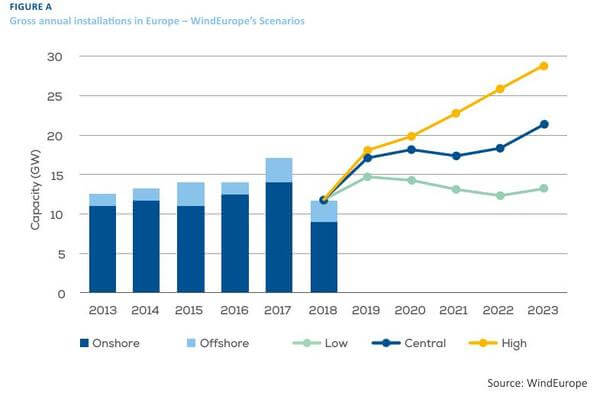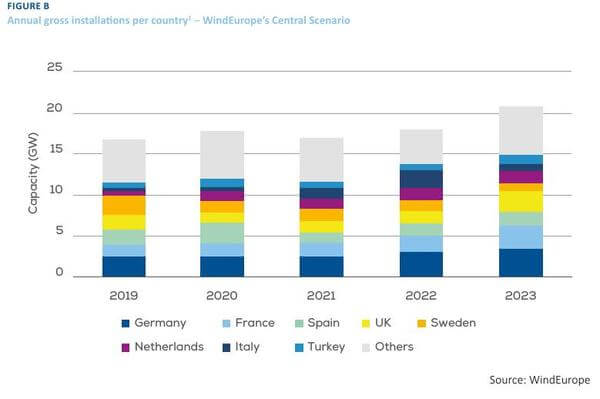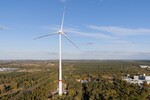News Release from windfair.net
Wind Industry Profile of
Uncertainty Ruling Europe
Wind Europe's new 'Wind Energy Outlook to 2023' gives an outlook on the development of wind energy in Europe over the next five years. The development is mainly characterised by great uncertainty, so that accurate forecasts are difficult to make.
For example, the annual increase in new wind capacity will fluctuate somewhere between 13 and 22 GW by 2023. This discrepancy of almost 10 gigawatts corresponds to the total capacity of the Italian wind market in 2018. The supply chain will be considerably burdened by the fluctuations. In addition, the cost reductions achieved for wind energy in recent years are being jeopardized.
This is due to the policies of the EU states. The main focus here is on the National Energy and Climate Plans (NECP), which according to the European Commission must be submitted by the end of the year. If the individual governments finally draw up clear and ambitious plans for their countries that improve the approval regulations for wind farms and include investments in new grid capacities, European wind energy capacity could grow by 88 GW to 277 GW by 2023.
If, on the other hand, the NECPs are not ambitious enough and the current major approval problems persist, much fewer new wind turbines will be installed in Europe by 2023: only 67 GW. However, if the approval situation improves, 112 GW could be installed over the next five years at best.

Particularly in Germany, approval problems in recent months have led to massive undersignings of auctions. The effects on the entire industry are already considerable: jobs are being lost, and various companies have fallen into difficulties. These include the German turbine manufacturer Senvion, which had to file for bankruptcy.
WindEurope CEO Giles Dickson names the problems: "Wind energy should be growing rapidly when you consider all the interest in climate change plus the fact that wind is the cheapest form of new power energy production. But there is real uncertainty about how far it’s going to expand in the next five years. It’s getting harder to secure permits for new wind farms in many countries. The grids and energy markets are still not functioning as they should. And many Governments simply haven’t decided yet how much new wind they want and when and how they’re going to build it."
Onshore Wind Energy continues to dominate
WindEurope assumes in the study that more than three quarters of the newly installed turbines will be installed onshore. Significant growth can be expected in Spain, Sweden and Norway in particular. The outlook is also good in France at present.
In the offshore sector, world market leader Great Britain continues to dominate. Over the next five years, the UK will account for 35% of growth in offshore wind energy, followed by the Netherlands and Germany, according to the forecast.
Old turbines reach the end of their operational life
In the next five years, 22 GW of wind power capacity will also reach the end of its normal operational life of 20 years. In mostcases the life span of the turbines will be extended, while around 2 GW will be repowered. A further 2 GW will be completely shut down. Although the wind industry would like to see more turbines repowered, policies and regulations by the respective governments still don't support these projects intensively enough.
Until 2023, Germany will remain the country with the largest wind fleet (72 GW in the central forecast scenario), followed by Spain (32 GW) and the UK (29 GW). These three countries will account for almost half of Europe's cumulative installed wind capacity by 2023.

Appeal to politics
Dickson points out that many governments still havn't decided how much new wind energy they want and when and how they will build it. The national energy and climate plans for 2030 will be crucial: If they aren't ambitious, Europe won't achieve the target of 32% renewable energy, let alone higher, actually necessary targets.
"And jobs are at stake here. The wind industry employs over 300,000 people in Europe but has lost 35,000 jobs in Germany alone over the last four years in large part because of public policy issues. The European Green Deal needs to include a clear industrial policy for Europe’s low-carbon industries: supporting the success stories we’ve established; ensuring we can continue to trade with the rest of the world; and driving continued innovation to stay competitive."
- Author:
- Katrin Radtke
- Email:
- press@windfair.net
- Keywords:
- WindEurope, forecast, outlook, market, capacity, expansion, Europe, fluctuation, Germany, UK, onshore, offshore, wind turbine, lifetime, appeal, politics, climate protection, wind power plant


























